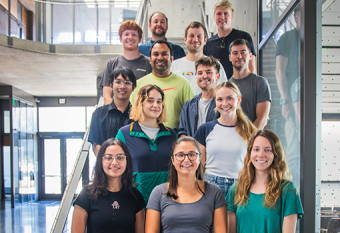
Phillip Christopher, a professor of chemical engineering at UC Santa Barbara, has received the 2025 Paul H. Emmett Award in Fundamental Catalysis from the North American Catalysis Society (NACS). The prize, first awarded in 1971, recognizes substantial contributions in the field of catalysis with emphasis on discovery and understanding of catalytic phenomena, proposal of catalytic reaction mechanisms and identification of and description of catalytic sites and species.
“Receiving this award fills me with pride for the students, postdocs, and collaborators whom I have had the privilege to work with over the years,” said Christopher, the Rinker Founder’s Chair and Mellichamp Chair of Sustainable Manufacturing. “The accolade recognizes their creative and thoughtful research, and I am truly honored to be part of such an inspiring group.”
The NACS recognized Christopher and his group for “uncovering fundamental insight into structure-function relationships of active sites in supported metal catalysts.” Researchers in his group have analyzed catalytic active sites on structures ranging from colloidally synthesized nanoparticles to atomically dispersed metal atoms on oxide supports. Through targeted syntheses, in-situ characterization, theoretical interrogation, and kinetic analyses, his group and collaborators have provided insights into active site structure, function and associated reaction mechanisms. Their research efforts have highlighted challenges, limits of detection, and common pitfalls of spectroscopic tools for characterizing active structures. These approaches have been applied to understand and design new materials for catalytic processes such as alkene epoxidation, hydroformylation, hydrodeoxygenation, and pollution abatement driven by thermal energy and visible photon excitation.
Christopher and the 2026 Emmett Award recipient, David Flaherty, a chemical and biomolecular engineering professor at the Georgia Institute of Technology, will present plenary lectures and be recognized during the 2025 North American Meeting of the Catalysis Society next June.
“I am humbled by this distinction, especially knowing that there are so many peers in the catalysis field whom I greatly admire and believe are equally deserving,” added Christopher, who previously received the Guiseppe Parravano Award for Excellence in Catalysis from the Michigan Chapter of NACS, the American Chemical Society’s Ipatieff Prize, the National Science Foundation’s Early CAREER Award, and the Presidential Early Career Award for Scientists and Engineers.
Paul H. Emmett was an American chemist best known for his pioneering work in the field of catalysis and for his work on the Manhattan Project during World War II. He spearheaded the research to separate isotopes of uranium and to develop a corrosive uranium gas.



